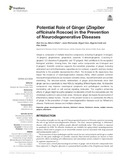Mostrar el registro sencillo del ítem
Potential role of ginger (Zingiber officinale Roscoe) in the prevention of neurodegenerative diseases
| dc.creator | Arcusa, Raúl | es_ES |
| dc.creator | Villaño Valencia, Débora | es_ES |
| dc.creator | Marhuenda, Javier | es_ES |
| dc.creator | Cano, Miguel | es_ES |
| dc.creator | Cerdá, Begoña | es_ES |
| dc.creator | Zafrilla, Pilar | es_ES |
| dc.date.accessioned | 2023-09-05T08:06:25Z | |
| dc.date.available | 2023-09-05T08:06:25Z | |
| dc.date.issued | 2022 | |
| dc.identifier.citation | Arcusa, R., Villaño, D., Marhuenda, J., Cano, M., Cerdà, B., & Zafrilla, P. (2022). Potential role of ginger (Zingiber officinale Roscoe) in the prevention of neurodegenerative diseases. Frontiers in Nutrition, 9, 809621. https://doi.org/10.3389/fnut.2022.809621 | en |
| dc.identifier.issn | 2296-861X | |
| dc.identifier.uri | https://hdl.handle.net/2454/46228 | |
| dc.description.abstract | Ginger is composed of multiple bioactive compounds, including 6-gingerol, 6-shogaol, 10-gingerol, gingerdiones, gingerdiols, paradols, 6-dehydrogingerols, 5-acetoxy-6-gingerol, 3,5-diacetoxy-6-gingerdiol, and 12-gingerol, that contribute to its recognized biological activities. Among them, the major active compounds are 6-shogaol and 6-gingerol. Scientific evidence supports the beneficial properties of ginger, including antioxidant and anti-inflammatory capacities and in contrast, a specific and less studied bioactivity is the possible neuroprotective effect. The increase in life expectancy has raised the incidence of neurodegenerative diseases (NDs), which present common neuropathological features as increased oxidative stress, neuroinflammation and protein misfolding. The structure-activity relationships of ginger phytochemicals show that ginger can be a candidate to treat NDs by targeting different ligand sites. Its bioactive compounds may improve neurological symptoms and pathological conditions by modulating cell death or cell survival signaling molecules. The cognitive enhancing effects of ginger might be partly explained via alteration of both the monoamine and the cholinergic systems in various brain areas. Moreover, ginger decreases the production of inflammatory related factors. The aim of the present review is to summarize the effects of ginger in the prevention of major neurodegenerative diseases such as Alzheimer's disease, Parkinson's disease and multiple sclerosis. | en |
| dc.format.mimetype | application/pdf | en |
| dc.language.iso | eng | en |
| dc.publisher | Frontiers Media | en |
| dc.relation.ispartof | Frontiers in Nutrition, 2022, 9, 809621 | en |
| dc.rights | Creative Commons Attribution License (CC BY) | en |
| dc.rights.uri | http://creativecommons.org/licenses/by/4.0/ | |
| dc.subject | Ginger | en |
| dc.subject | Neurodegenerative diseases | en |
| dc.subject | Alzheimer´s disease | en |
| dc.subject | Parkinson´s disease | en |
| dc.subject | Multiple sclerosis | en |
| dc.subject | Gingerol | en |
| dc.subject | Antioxidants | en |
| dc.title | Potential role of ginger (Zingiber officinale Roscoe) in the prevention of neurodegenerative diseases | en |
| dc.type | Artículo / Artikulua | es |
| dc.type | info:eu-repo/semantics/article | en |
| dc.date.updated | 2023-09-05T08:00:33Z | |
| dc.contributor.department | Agronomía, Biotecnología y Alimentación | es_ES |
| dc.contributor.department | Agronomia, Bioteknologia eta Elikadura | eu |
| dc.rights.accessRights | Acceso abierto / Sarbide irekia | es |
| dc.rights.accessRights | info:eu-repo/semantics/openAccess | en |
| dc.identifier.doi | 10.3389/fnut.2022.809621 | |
| dc.relation.publisherversion | https://doi.org/10.3389/fnut.2022.809621 | |
| dc.type.version | Versión publicada / Argitaratu den bertsioa | es |
| dc.type.version | info:eu-repo/semantics/publishedVersion | en |



